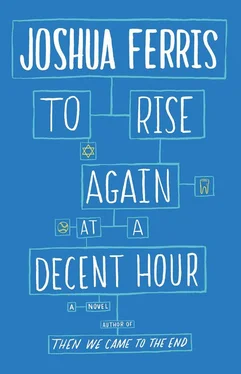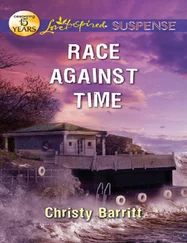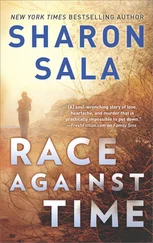What terrifying hour was this, and why was I made to wake to it? Where were they, the strangers I had just been toasting? Never before had the Promenade emptied out so entirely, so finally, and instead of the familiar, noisy, peopled landmark of one of the biggest cities on earth, where you are promised never to be alone, it seemed now like a colony on the moon floating in an eternal night, with me as its only inhabitant. All of this hit me literally within the first second or two of waking up, and that moment was unbearable. I felt so forgotten, so passed over, so left behind, so lost out. I was sure not only that everything worth doing had already been done while I was asleep but also that, now that I was awake, there was no longer anything worth doing. The solution at desperate moments like this was always to find something to do, and I mean anything, as quickly as possible. My first instinct was to reach for my me-machine. It put me in instant touch, it gave me instant purpose. Maybe Connie had called or texted or emailed, or Mercer, or… but no. No one had called or emailed or texted. I would do practically anything, I thought, to have them back — I mean the strollers and lovers of a few hours earlier, so that I might have another chance to stroll alongside them, to look out in wonder at the skyline, to lick carefully at the edges of my ice cream, and, after a while, to leave the Promenade, off to bed for a good night’s sleep — or to that one vital thing among the city’s offerings that night, that one unmissable thing that makes staying up all night a treasure and not a terror — and then to rise again at a decent hour, to walk the Promenade in the light of a new morning, eating a little pastry for breakfast and having coffee on one of the benches while looking out at the brightened waters. Oh, come back, you people lost to darkness! Come back, you ghosts. The day is hard enough. Don’t leave me alone with the night. Finally I was able to move. I sat up in the chair and listened. There was the hum of the river, and the island across the river, and the last desultory traffic of the night washing by on the expressway below. I can only suggest the effect it had on me, that is, the feeling that my life, and the city’s, and the world’s every carefree, winsome hour, were perfectly without meaning.
“THERE YOU ARE, MY boy,” Sookhart said as he handed me the book.
I took it, studied it, turned it over in my hands. The worn leather cover was blank from front to back, without author or title, inconspicuous. I opened it. The ancient spine cracked like a nut. By all appearances, it was as old as Sookhart claimed. It naturally fell open to cantonment 240—or something 240, at any rate: the strange characters squiggled before my eyes incomprehensibly. I ran my finger down the stitching that held the pages together. But as for making sense of the words, there was no way.
“What do you think?” he asked.
“How do I know it’s real?”
“My boy, look at it. It’s the strangest curio I’ve ever encountered in all my career. I don’t recognize a single proper name in it. Safek and Ulmet and Rivam and all the rest. It’s like it burrowed its way up from the center of the earth.”
“Is this Yiddish?”
He nodded.
“And can you confirm that it’s as old as you say it is?”
“It’s one hundred fifty years old if it’s a day,” he said.
“How can I be sure?”
“Do you doubt me?”
He looked offended.
“Never mind,” I said. “It doesn’t matter.”
For some reason, out of habit maybe, as I was leaving, I asked him for a bag. He had to unpack his breakfast, a banana and a yogurt, and I carried the book out in a plastic sack from Whole Foods.
“Have I not been honest with you from the beginning?” he asked.
From the moment you inquired, did I not tell you about Mirav? And did I not explain that my involvement with her happened before I learned the truth of my history, of our history? Yes, I fell in love, and yes, I was devoted to Judaism. But it was a mistake, Paul. It was misdirected passion.
Come, Paul, and see what remains to be seen. Take the genetic test, and claim the final piece of your family history. Don’t take their word over ours.
The following Monday morning, in the middle of September, the unwinding of PM Capital began, and Pete Mercer withdrew from the financial markets. He sold off his holdings and returned his clients’ money — at a significant profit, according to the Wall Street Journal, which also reported that one of the fund’s every two dollars had been parked in gold since the start of the Great Recession.
He had not returned any of a dozen messages I left on his phone.
What will he do? I wondered, after I read about him in the news. Now that the models have been dismantled, the portfolios liquidated, the traders paid off and sent home, the desks cleared, and the screens made dark, what will the man do?
The Journal’ s disclosure that his personal payout from PM Capital amounted to 4.9 billion dollars offered a possible answer: anything he wants. He had considerable money to watch. Maybe, I thought, he just wants to do it from home, surrounded by computer banks and a wall of competing images, never leaving, turning from eccentric into full-blown recluse. Or maybe he will be like one of the country’s nouveau riche, today’s tech billionaires, and take up causes, campaigns, pursuits, and hobbies: yachting, sports-franchise ownership, the eradication of malaria. Or maybe he’ll simplify, I thought, down to a backpack and a new pair of boots, and trek, as searchers before him have trekked, across India, Nepal, and Tibet, to sit at the feet of crouching figures, under trees overlooking snow-tipped landscapes. Despite language barriers, he will find, bestowed upon him at the rise of dawn, the inner peace that eluded him all his desk-bound days. His existence as one of the wealthiest hedge-fund managers in history will be recalled only as a former life low on the chain of karmic rebirth. Or maybe he’ll marry, start a family, and center his days around the mundane realities that define most people’s lives: diapers and birthdays and playdates. By partaking of these unspectacular delights, he will find a place for himself that fits and sustains him, to his eternal surprise. Or maybe he will go to Israel and live at Seir as he said he would. Maybe that was still on. He’ll make it habitable, even extravagant. After all, what can’t be accomplished with five billion dollars? He could literally change the world.
But I didn’t know what he would do, because I didn’t really know him. I’d had lunch with him twice and a drink with him once. Each time he opened up a little more. His despair, as it slowly revealed itself, took me aback. He was free to bark and command, to covet, to conquer, to advance, to own, to borrow and bend and leverage and take, to conduct himself with the implacable autism of obscene wealth. But his choice of lunch was sloppy and cheap. Dreaming of a shit hole smelling of goat piss, he gave away a Picasso. And he wasn’t above getting drunk at a dive bar with the likes of me. He believed that he and I shared something in common. And maybe we did. All the money in America could not have made the man happy. For me, Rubber Soul ; for him, the dollar bill. But if we were alike, what he chose to do after hearing Mirav’s story and dismantling his operation served to put my back up against the wall. He didn’t retreat into eccentricity or start a family. He bought a gun, walked out into the woods, and shot himself in the head. It may not have been productive or charitable or imaginative or fun, but the act did make plain the extent of his despair. He was found by children following the trail of the gunshot.
Читать дальше












